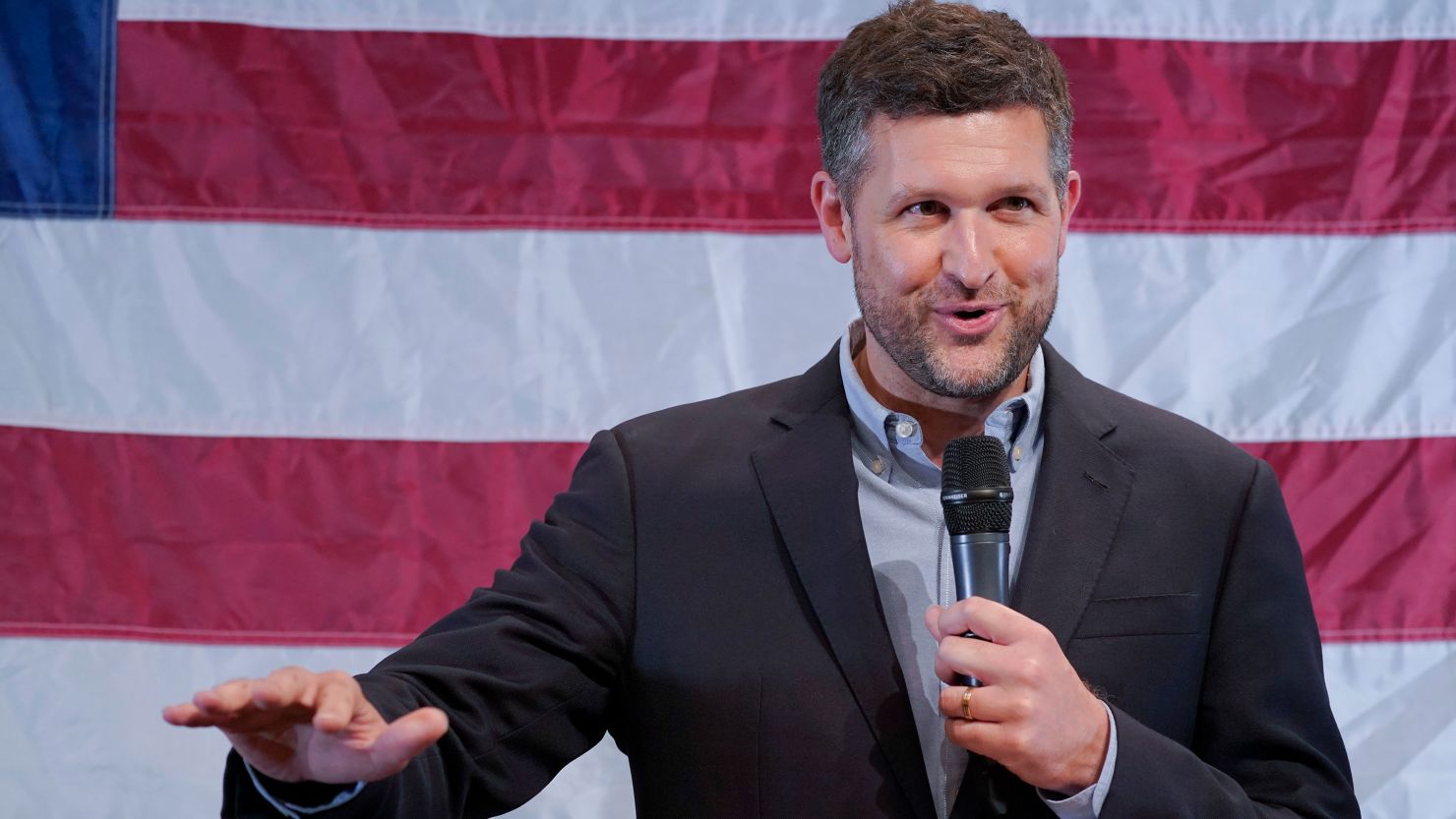The US Supreme Court decision wiping out federal abortion rights was only a few hours old when, in Washington, a group of Democratic lawmakers stood on the steps of the US Capitol singing “God Bless America.”
In upstate New York, though, Democrat Pat Ryan and his campaign team were scrambling to deliver a more potent reply, posting online an ad they had filmed shortly after the court’s draft opinion had leaked weeks earlier.
The appeal began like so many others, with a note on the Ulster County executive’s personal history: two tours in Iraq fighting “for our families, for our freedom.”
But the spot then pivoted, the music speeding up.
“How can we be a free country?” Ryan asked, “if the government tries to control women’s bodies? That’s not the country I fought to defend.”
The Ryan campaign’s quick messaging, delivered as abortion rights supporters filled the streets, came nearly two months to the day that he would defeat Republican Marc Molinaro, the moderate executive from neighboring Dutchess County, in a special election that attracted national attention. The result provided the clearest evidence yet that abortion rights are a powerful motivator for voters – both Democrats and, potentially, some moderate Republicans – ahead of the midterm elections.
It also further upended the long-running assumption, among candidates and operatives across partisan lines, that an inexorable Republican “red wave” was coming to wipe out Democrats in battleground districts across the country, saddled by President Joe Biden’s low approval ratings and angst over the economy.
Ryan’s victory built on a run of encouraging signs for Democrats. While they have lost all other special House election since the court’s June decision, Democrats have improved on Biden’s 2020 margin in all four races – including in Nebraska and Minnesota, where Republican candidates prevailed but underperformed former President Donald Trump in each district by 6 percentage points. New York’s 19th District, meanwhile, is a proven national bellwether, having voted for Barack Obama in 2012, Trump in 2016 and Biden in 2020.
“You are going to see a lot about individual freedom and the right of women to control their own bodies,” said Abby Curran Horrell, executive director of House Majority PAC, the leading outside group charged with keeping Democrats in control of the chamber. “Voters care about abortion rights and voters care about individual freedom, and they don’t like the fact that Republicans want to rip that right away.”
New York’s 19th District only opened this spring after Democrat Antonio Delgado left to become the state’s lieutenant governor. The GOP heavily outspent Democrats in the special election, with the National Republican Congressional Committee ultimately investing more than $1.2 million. The Congressional Leadership Fund, a Republican super PAC, also spent more than $560,000, according to recent filings.
Republicans react
In the early aftermath of Tuesday’s election, Republicans sought to downplay the national implications of the result, insisting that the core challenges facing Democrats this fall remain in place, while also conceding that Democratic base anger over abortion rights had closed much of the enthusiasm gap the GOP enjoyed for most of the year.
“There’s definitely been a little bit of an uptick in Democratic enthusiasm, but that’s something we’ve been seeing for some time,” CLF president Dan Conston said. “I don’t think that that fundamentally changes anything in the House.”
Republicans are dismissing the need to change direction or alter their messaging and arguing that the specific conditions of the New York special election – in a state that also held closed primaries on the same day, shutting out independent voters – make it difficult to draw broader conclusions for about Republicans’ fall fate.
“Majorities are won in November, not August,” NRCC communications director Michael McAdams said. “We look forward to prosecuting the case against Democrats’ failed one-party rule that’s left American families worse off.”
Other Republicans say the biggest takeaway is that, while abortion remains a motivating issue for the Democratic die-hards, it does not change the fundamentals of a campaign in which most voters put economic issues at the top of their list of concerns.
“Specials are entirely just base turnout. They give no indication where the middle is,” Conston said. “I don’t have serious cause for concern.”
An unapologetic message
But Ryan’s success – and the way he delivered his message – point to a clear throughline with the results of a referendum in Kansas, three weeks ago, in which voters in the deep-red state overwhelmingly rejected a ballot measure that would’ve given the GOP-led state legislature the ability to push an abortion ban.
Following the leak of the draft Supreme Court opinion overturning Roe, Ryan marched in a series of abortion rights rallies. The feeling on the ground, he told CNN on Wednesday, was visceral – and the hunger for an unapologetic messenger was palpable. The West Point graduate tried to be just that, weaving in familiar themes of “freedom” to his abortion rights messaging.
“It was just so clear how deeply this hit people and how scared they were and how sad they were and how angry they were,” Ryan said. “We had to bring voice to that and put it under a larger umbrella and framework so that people who might not have had that personal experience could still understand it as a real assault on other Americans’ rights and understand that it would have consequences for them as well.”
That also meant, a Ryan campaign aide told CNN, encouraging their candidate talk about the issue in a tone and text that felt more authentic to him.
Abortion is often discussed in “boiler plate (terms) or branded as this women’s issue, or just about reproductive health,” she said. “You can’t talk about rights being under assault in language that’s too technical or less emotive.”
More concerning for Republicans, though, might be the apparent failure of their own tactics in trying to cast Ryan, in television ads, as a left-wing radical in league with violent anti-police protesters. One spot, which featured an image of the Democrat marching at a Black Lives Matter demonstration after the murder of George Floyd in 2020, gained less attention for its intended message than for the fact that Molinaro, too, had attended the peaceful rally.
Ryan said he believes the NRCC and Molinaro lost the plot in the final weeks of the race and, in a crucial misstep, bet too much on driving turnout among the Republican base in such a closely divided district.
“It was a panic move to lean into the really extreme ideology, to get attached at the hip with (New York Rep. Elise Stefanik), to go on Newsmax, to go on Breitbart,” Ryan said, referencing Molinaro’s recent rallies with Stefanik, a close Trump ally and the No. 3 House Republican, and his conservative media appearances. “It was panicked and it clearly backfired.”
Democratic leaders, meanwhile, are delighting in the outcome of a race they had previously sought to downplay, being cautious with resources and publicly tempering expectations.
“If there was any kind of Republican wave coming, they would’ve won that seat,” said New York Rep. Sean Patrick Maloney, chair of the Democratic Congressional Campaign Committee. “You cannot win a big majority from the House of Representatives without winning that district. It’s as simple as that.”
The DCCC was outspent 2-to-1 in the special election, but Maloney dismissed criticism that the group should have been more involved. (VoteVets, a Democratic group that supports veteran candidates, backed Ryan with more than $500,000.)
“We spent significantly in this race, but I’m proud that the Republicans wasted two or three times the money and still came up short. I’d say we got it just right here, because we had a strong candidate with the right message,” Maloney said.
“It’s not the only place it’s going to work.”










